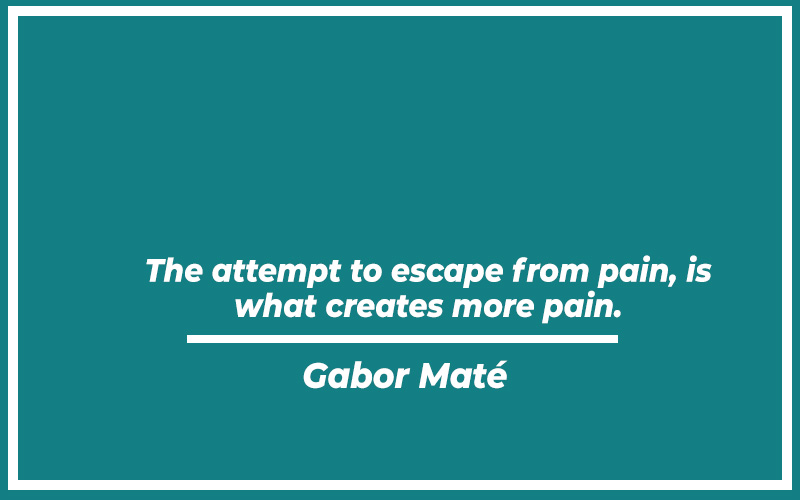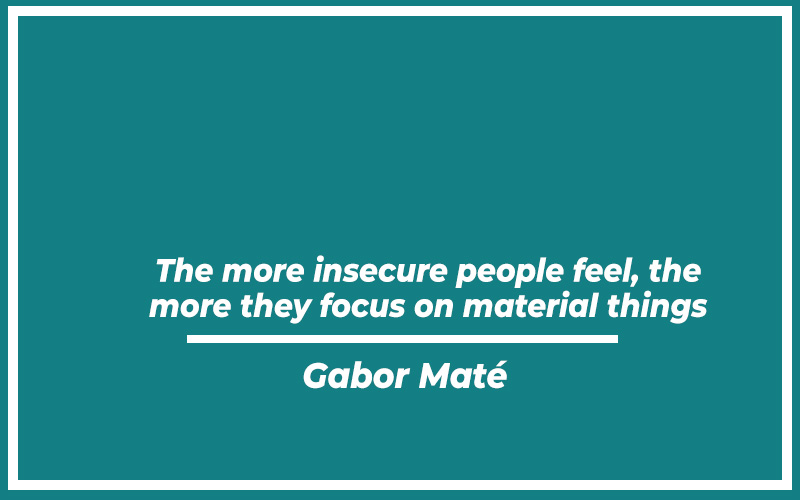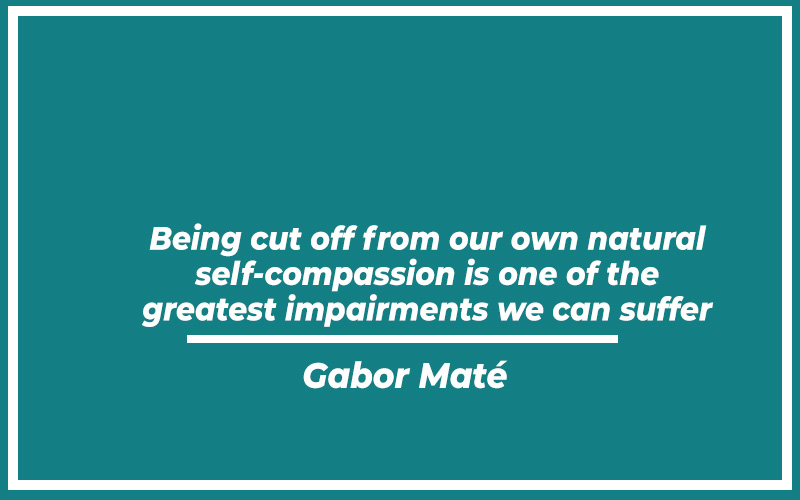Have you ever read a quote that made you pause and reflect on your own life experiences and health? Gabor Maté’s quotes do just that.
Known for his insightful perspectives on addiction, stress, and childhood development, Maté’s words often shed light on how our environment affects our mental and physical health.
When you delve into his quotes, you’ll find a blend of compassion and stark realism that encourages a deeper understanding of human behavior and the roots of our struggles.
Best Gabor Mate Quotes

“The attempt to escape from pain, is what creates more pain.” – Gabor Maté
Gabor Maté emphasizes that avoiding pain often leads to deeper suffering. This quote underlines the importance of confronting pain directly, suggesting that evasion can extend and intensify discomfort. Maté advocates for addressing pain at its source, which can lead to healing and prevent the cycle of suffering.
This approach encourages personal growth and resilience, teaching that facing challenges head-on is more beneficial than avoiding them. Understanding and accepting our pain, rather than fleeing from it, offers a path to true relief and emotional health.
Also Read: Jalen Hurts Quotes (with Explanations)
“Not why the addiction, but why the pain.” – Gabor Maté
Gabor Maté encourages looking beyond the behavior of addiction to understand the underlying emotional or psychological pain that drives it. This quote shifts the focus from judgment to empathy, promoting a deeper inquiry into the causes of addictive behaviors.
By addressing the root issues, we can offer more effective support and facilitate genuine healing. This perspective not only humanizes individuals struggling with addiction but also enhances the approaches to treatment, focusing on compassionate understanding rather than condemnation.
“If we want to help people seek the possibility of transformation within themselves, we first have to transform our own view of our relationship to them.” – Gabor Maté
Gabor Maté highlights the importance of self-transformation in the process of helping others. This quote suggests that before we can effectively assist someone in their personal growth, we must examine and adjust our perceptions and attitudes towards them.
By altering our approach, we can become better supporters and enablers of their transformation. This involves cultivating empathy, patience, and openness, which are crucial for fostering an environment where others can safely explore and initiate changes within themselves.
“The onset of inauthenticity may not be a choice, but with awareness and self-compassion, authenticity can be.” – Gabor Maté
This quote by Gabor Maté discusses the often involuntary nature of inauthentic behavior and presents self-awareness and compassion as tools for fostering authenticity.
He suggests that many people live inauthentically as a response to external pressures, but through conscious effort and self-kindness, one can reclaim genuine self-expression. This journey towards authenticity requires recognizing and understanding one’s true feelings and desires, and gently steering one’s life to align with these truths.
“Our birthright as human beings is to be happy, and the addict just wants to be a human being.” – Gabor Maté
Gabor Maté humanizes addiction by linking it to the universal pursuit of happiness. This quote challenges the stigma associated with addiction, framing it as an attempt to fulfill a basic human need for happiness, albeit in a misguided way.
Understanding addiction in this light calls for compassion and a supportive approach that acknowledges the addict’s humanity and their inherent right to seek happiness. It urges society to treat individuals with addiction with the same dignity and respect as any person striving for a fulfilling life.
“Passion creates, addiction consumes.” – Gabor Maté
Gabor Maté contrasts the constructive nature of passion with the destructive nature of addiction. This quote highlights how passion leads to creativity and productivity, enriching one’s life, while addiction depletes personal resources, leading to loss and degradation.
He encourages cultivating passions that positively impact life and warns against the pitfalls of addictive behaviors that consume one’s vitality and potential. Embracing and nurturing healthy passions can serve as a powerful antidote to addiction, providing meaningful engagement and fulfillment.
“Learn to read symptoms not only as problems to be overcome but as messages to be heeded.” – Gabor Maté
Gabor Maté advises a holistic approach to understanding symptoms, whether they are physical, emotional, or psychological. This quote suggests that symptoms are not merely obstacles to be eliminated but are important signals that indicate underlying issues needing attention.
By interpreting symptoms as messages, individuals can address deeper imbalances and foster overall health. This perspective encourages a more integrative and insightful approach to health and wellness, where symptoms guide us toward healing rather than merely being eradicated.
“Not all addictions are rooted in abuse or trauma, but I do believe they can all be traced to painful experiences.” – Gabor Maté
Gabor Maté highlights the common thread in the genesis of addictive behaviors—painful experiences. This quote suggests that while not every addiction stems from trauma or abuse, they all originate from some form of emotional pain.
Understanding this can shift how society approaches addiction, from judgment to empathy, focusing on healing the underlying pain rather than merely condemning the addiction. This perspective advocates for a compassionate approach that seeks to understand and address the root causes of addictive behaviors.
“The more insecure people feel, the more they focus on material things.” – Gabor Maté
This quote by Gabor Maté discusses the psychological patterns that lead to materialism. He suggests that insecurity drives individuals to seek fulfillment in material possessions, which promises happiness but ultimately leads to dissatisfaction.
This observation points to the need for addressing deeper emotional and psychological needs rather than succumbing to the superficial comfort offered by materialism. Understanding this dynamic can help individuals focus on more meaningful aspects of life, such as personal growth and genuine connections.
“Strong convictions do not necessarily signal a powerful sense of self; very often quite the opposite.” – Gabor Maté
Maté challenges the common perception that strong convictions are indicative of a strong self-concept. He proposes that intense beliefs can sometimes be a compensatory mechanism for inner emptiness or insecurity.
This insight encourages individuals to examine the motivations behind their firmly held beliefs and consider whether they are truly reflective of their values or are serving to mask deeper issues. It invites a deeper self-awareness and authenticity in one’s convictions and beliefs.
“It is impossible to understand addiction without asking what relief the addict finds, or hopes to find, in the drug or addictive behavior.” – Gabor Maté
This quote emphasizes the importance of understanding the function that addictive behaviors serve for the individual. Maté suggests that addiction is not just a habit but a coping mechanism that provides temporary relief from pain or discomfort.
Recognizing this can lead to more effective interventions that address the underlying reasons for addiction, rather than focusing solely on the behavior itself. This approach fosters a more empathetic and supportive framework for helping individuals struggling with addiction.
“Adolescents who rely on peers their own age for emotional acceptance are more likely to be hurt.” – Gabor Maté
Maté points out the vulnerabilities associated with adolescents seeking approval and emotional support primarily from their peers. This dependency can lead to emotional distress due to the instability and pressure of peer relationships.
The quote underscores the importance of fostering diverse support systems that include adults or mentors who can provide more stable and unconditional support, highlighting the need for comprehensive emotional education and support structures for adolescents.
“Trauma can be the gateway to discovering our true selves and living a more authentic and fulfilling life.” – Gabor Maté
This optimistic perspective on trauma suggests that it can act as a catalyst for profound personal growth and self-discovery. Maté proposes that navigating through trauma, with proper support and self-awareness, can lead individuals to a deeper understanding of themselves and a more authentic existence.
This view reframes trauma as an opportunity for transformation, encouraging those affected to seek healing and growth through their experiences.
“We are not our symptoms.” – Gabor Maté
Gabor Maté encourages a dissociation between individuals and their symptoms, whether they are physical, psychological, or emotional. This quote is a reminder that symptoms are merely manifestations of deeper issues and should not define one’s identity.
Recognizing this separation allows for a more compassionate self-view and a focus on healing the underlying causes of those symptoms. This approach promotes a holistic view of health and well-being, emphasizing the importance of treating the whole person rather than just the symptoms.
“Not all addictions are rooted in abuse or trauma, but I do believe they can all be traced to painful experiences.” – Gabor Maté
Gabor Maté highlights that the root of addiction often lies in pain, even if not directly from abuse or trauma. This insight encourages a compassionate perspective, suggesting that treatments should address the underlying emotional pain to be effective.
Recognizing pain as the common denominator in addiction can shift the approach from punitive measures to empathetic support, aiming for healing rather than judgment. This approach fosters a deeper understanding of the addict’s experience and promotes more sustainable recovery strategies by addressing the core issues rather than just the symptoms.

“The more insecure people feel, the more they focus on material things.” – Gabor Maté
Gabor Maté suggests that insecurity often drives materialism as individuals seek external symbols of worth to compensate for internal doubts. This quote encourages reflection on our values and motivations, promoting emotional and psychological growth over material accumulation.
Understanding this dynamic can help individuals focus on building genuine self-esteem and connections rather than superficial acquisitions. This shift in focus can lead to more meaningful and satisfying lives, where happiness is derived from personal fulfillment rather than material success.
“Strong convictions do not necessarily signal a powerful sense of self; very often quite the opposite.” – Gabor Maté
Gabor Maté challenges the notion that firm convictions always reflect a strong self-concept, suggesting they can sometimes mask deeper insecurities. This perspective invites individuals to examine their beliefs critically, considering whether they stem from true understanding or are defensive mechanisms against vulnerability.
Encouraging this introspection can lead to more authentic expressions of self, where convictions are aligned with genuine beliefs and understanding rather than serving as shields against perceived threats.
“It is impossible to understand addiction without asking what relief the addict finds, or hopes to find, in the drug or addictive behavior.” – Gabor Maté
Gabor Maté emphasizes understanding the relief or escape that addiction provides to the sufferer. By recognizing addiction as a maladaptive coping mechanism rather than a moral failing, we can approach it with more empathy and effectiveness.
This perspective shifts the focus of treatment from punishment to helping individuals find healthier ways to cope with their pain, potentially leading to more successful recovery outcomes and reducing the stigma associated with addiction.
“Adolescents who rely on peers their own age for emotional acceptance are more likely to be hurt.” – Gabor Maté
This quote by Gabor Maté highlights the emotional risks adolescents face when they depend heavily on peer approval. It underscores the importance of fostering diverse support systems that include adults or mentors, who can offer more stable and unconditional support.
By broadening their emotional base, young people can navigate the turbulent waters of adolescence with greater resilience and security, potentially avoiding some of the emotional upheavals associated with peer reliance.
“Trauma can be the gateway to discovering our true selves and living a more authentic and fulfilling life.” – Gabor Maté
Gabor Maté views trauma not just as a source of suffering but as an opportunity for profound personal growth and self-discovery. He suggests that navigating through trauma, with appropriate support, can lead to a deeper understanding of oneself and a more authentic life.
This reframing of trauma encourages individuals to seek meaning and growth in their experiences, promoting resilience and a proactive stance towards recovery and self-awareness.
“We are not our symptoms.” – Gabor Maté
Gabor Maté advocates for a separation between individuals and their symptoms, emphasizing that symptoms are manifestations of deeper issues rather than defining characteristics. This distinction is crucial for compassionate self-perception and effective treatment.
Recognizing that we are not defined by our symptoms allows for a broader understanding of our health and encourages treatments that address underlying causes. This holistic approach fosters a healthier relationship with ourselves and our bodies, promoting healing and well-being.
“The attempt to escape from pain, is what creates more pain.” – Gabor Maté
Gabor Maté emphasizes that avoiding pain often leads to greater suffering. By attempting to escape discomfort, individuals may engage in behaviors that exacerbate their distress. This perspective encourages confronting and processing pain directly, fostering healing and resilience.
Acknowledging and addressing underlying issues can prevent the cycle of avoidance and additional pain, leading to more effective coping strategies and emotional well-being. Embracing discomfort as a part of the human experience allows for personal growth and the development of healthier responses to life’s challenges.
“Not why the addiction, but why the pain.” – Gabor Maté
This quote shifts the focus from the addictive behavior to the underlying pain driving it. Gabor Maté suggests that understanding the root cause of addiction requires exploring the emotional suffering that precedes it. By addressing the pain, rather than solely the behavior, more compassionate and effective interventions can be developed.
This approach promotes empathy and a deeper comprehension of the individual’s experience, facilitating healing and recovery. Recognizing the pain behind addiction challenges stigmatization and supports a more holistic view of treatment.
“The difference between passion and addiction is that between a divine spark and a flame that incinerates.” – Gabor Maté
Gabor Maté contrasts passion and addiction, highlighting that passion inspires and creates, while addiction consumes and destroys. Passion is a motivating force that enriches life, whereas addiction depletes resources and well-being. This distinction encourages individuals to pursue healthy passions that contribute positively to their lives, rather than falling into destructive addictive patterns.
Understanding this difference can guide personal choices and promote a balanced, fulfilling life. Cultivating passions mindfully ensures they remain sources of joy and growth, not harm.
“When I am sharply judgmental of any other person, it’s because I sense or see reflected in them some aspect of myself that I don’t want to acknowledge.” – Gabor Maté
This quote suggests that harsh judgments of others often mirror unrecognized aspects of ourselves. Gabor Maté implies that self-awareness can reduce judgmental attitudes, fostering empathy and understanding. By acknowledging and addressing our own flaws, we become less inclined to criticize others, leading to more harmonious relationships.
This introspective approach promotes personal growth and emotional intelligence, encouraging a compassionate view of both ourselves and those around us. Recognizing our projections onto others can transform judgment into self-reflection and improvement.
“The greatest damage done by neglect, trauma or emotional loss is not the immediate pain they inflict but the long-term distortions they induce in the way a developing child will continue to interpret the world and her situation in it.” – Gabor Maté
Gabor Maté emphasizes that the lasting impact of early adverse experiences lies in the altered perceptions they create. These distortions can affect a child’s worldview and self-concept, influencing behavior and relationships into adulthood. Understanding this can inform therapeutic approaches that aim to reframe these perceptions, promoting healing and healthier interpretations of oneself and the world.
Addressing these deep-seated beliefs is crucial for breaking cycles of dysfunction and fostering resilience. Early intervention and supportive environments can mitigate these long-term effects.
“The research literature has identified three factors that universally lead to stress: uncertainty, the lack of information and the loss of control.” – Gabor Maté
This quote identifies uncertainty, lack of information, and loss of control as primary stressors. Gabor Maté highlights that these factors can significantly impact mental and physical health. Recognizing these stressors allows individuals and organizations to develop strategies to mitigate their effects, such as improving communication, providing clear information, and empowering individuals with choices.
Addressing these areas can reduce stress levels and promote well-being. Creating environments that offer predictability, transparency, and autonomy can enhance resilience and overall health.

“Being cut off from our own natural self-compassion is one of the greatest impairments we can suffer.” – Gabor Maté
Gabor Maté underscores the importance of self-compassion for mental and emotional health. Lacking self-compassion can hinder healing, dignity, and love. Cultivating self-compassion involves treating oneself with kindness and understanding, especially during times of failure or suffering.
This practice can lead to greater emotional resilience and a more positive self-image. Embracing self-compassion allows individuals to navigate life’s challenges with greater ease and fosters a healthier relationship with oneself. It is a foundational aspect of personal well-being and growth.
Also Read: Ariana Grande Quotes (with Explanation)
Final Thoughts
So, when you come across Gabor Maté’s quotes, let them resonate with you. These aren’t just observations; they are invitations to explore the deeper aspects of your health and emotional well-being.
Whether they inspire you to change your perspective or challenge you to address unresolved issues, remember that his insights are tools for healing and growth.
Embrace these quotes as stepping stones on your journey towards greater self-awareness and holistic health.

